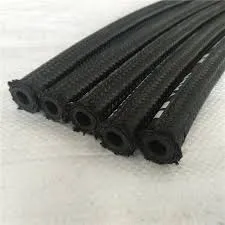Sep . 23, 2024 02:10 Back to list
ce certification msha hydraulic hose exporter
Certification and Compliance for Hydraulic Hose Exporters A Focus on CE and MSHA Standards
In the global market, manufacturers and exporters of hydraulic hoses must navigate a complex landscape of regulations and certifications to ensure their products meet safety and performance standards. Among the most significant certifications in this domain are CE (Conformité Européenne) and MSHA (Mine Safety and Health Administration) standards. These certifications are crucial not only for market access but also for ensuring the safety and reliability of hydraulic hoses in various applications.
Understanding CE Certification
CE marking is a declaration by the manufacturer that their product meets the essential requirements of relevant European directives. For hydraulic hoses, this includes safety, health, and environmental protection standards. The CE mark allows these products to be sold within the European Economic Area, signaling compliance with EU regulations. Exporters must ensure that their hydraulic hoses undergo rigorous testing, including assessments of their durability, pressure resistance, and overall performance.
To achieve CE certification, hydraulic hose exporters must follow a detailed process that includes product design, testing, and quality assurance. They need to keep precise documentation of compliance processes and material specifications. This ensures that products not only meet regulatory requirements but also foster consumer trust in their safety and reliability.
Importance of MSHA Compliance
In the United States, hydraulic hoses used in mining and other harsh environments must comply with MSHA regulations. These regulations are designed to protect miners by ensuring that the equipment they use is safe and minimizes the risk of accidents. MSHA certification involves stringent testing and adherence to safety standards specific to mining operations.
ce certification msha hydraulic hose exporter

For hydraulic hose exporters, understanding and complying with MSHA standards is essential for tapping into the mining industry. The certification process may require detailed product testing, including evaluations of resistance to abrasion, temperature variation, and hydraulic fluid compatibility. By obtaining MSHA certification, exporters can significantly broaden their customer base within the mining sector, ensuring that their products meet operational demands and safety standards.
The Importance of Quality Assurance
Quality assurance is a crucial aspect of both CE and MSHA certifications. Exporters must not only focus on achieving certifications but also on maintaining high-quality manufacturing processes. Regular audits, quality checks, and continuous improvement programs are essential to ensure that hydraulic hoses remain compliant with ever-evolving regulations.
Furthermore, fostering strong communication channels with clients and stakeholders about compliance is vital. Transparency in the certification process builds trust and reinforces the commitment to safety and quality. Many buyers prioritize working with manufacturers and exporters who demonstrate a proactive approach to regulatory compliance.
Conclusion
In conclusion, CE and MSHA certifications are critical for hydraulic hose exporters aiming for success in global markets. By prioritizing compliance and maintaining high quality standards, exporters can enhance their reputation, increase market access, and ultimately contribute to safer working environments in various industries. As regulatory landscapes evolve, staying informed and adaptable will be key for exporters to thrive in this competitive field.
-
Best Four Steel Wire Spiral Hose Hydraulic R12 – Durable High-Pressure Hose Manufacturer
NewsJul.08,2025
-
High-Quality 1/4 Hydraulic Hose – Soft, Flexible & Durable Rubber Hoses for Industrial Use
NewsJul.08,2025
-
1 1 2 Inch Hydraulic Flexible Hose - Durable, Reliable, High-Pressure Solutions
NewsJul.07,2025
-
High-Quality 1 2 Rubber Hose - Durable, Flexible Hydraulic Solutions
NewsJul.07,2025
-
Discover SAE Hydraulic Hose Types - High Quality & Durable Hoses from Leading Factory Supplier
NewsJul.06,2025
-
High Pressure Wire Hydraulic Rubber Hose Supplier Durable & Reliable 1SN Hose Solutions
NewsJul.06,2025
